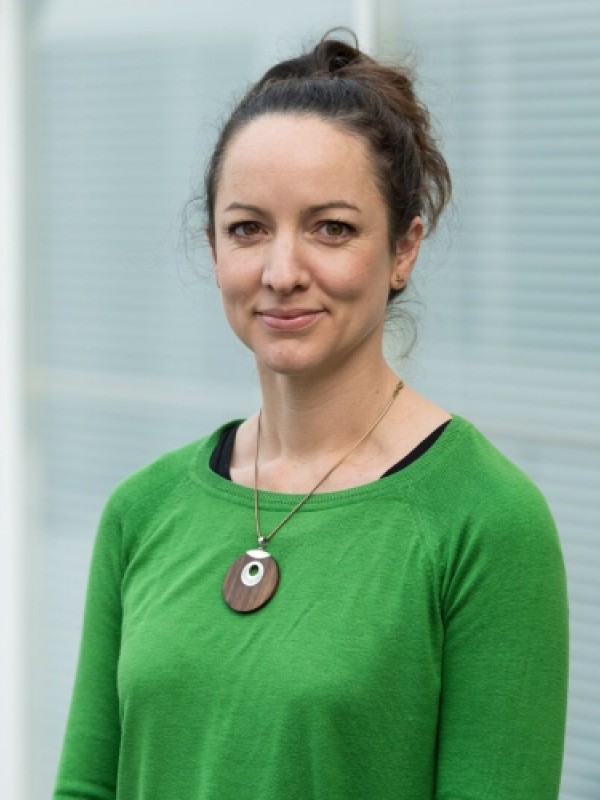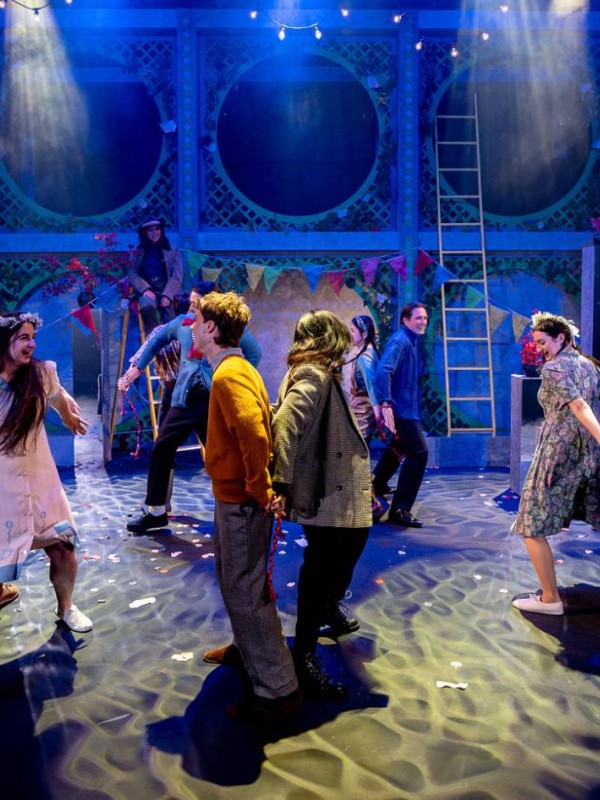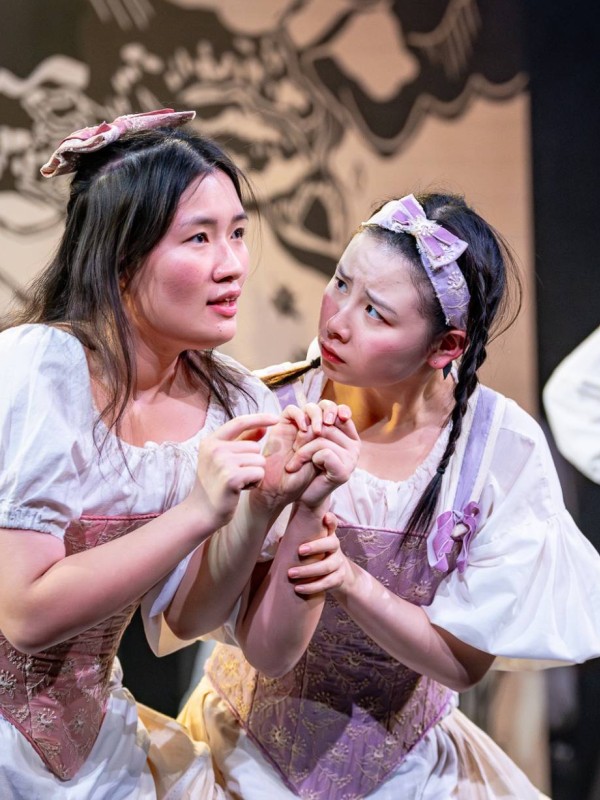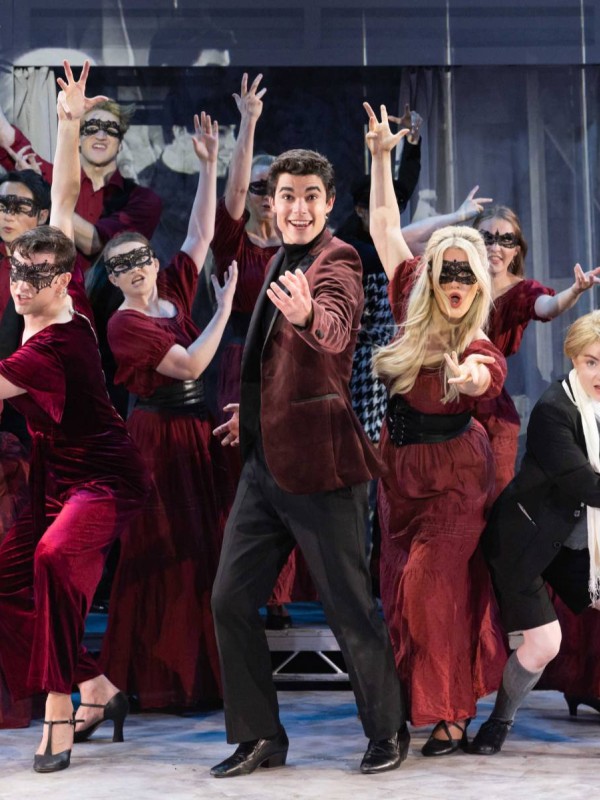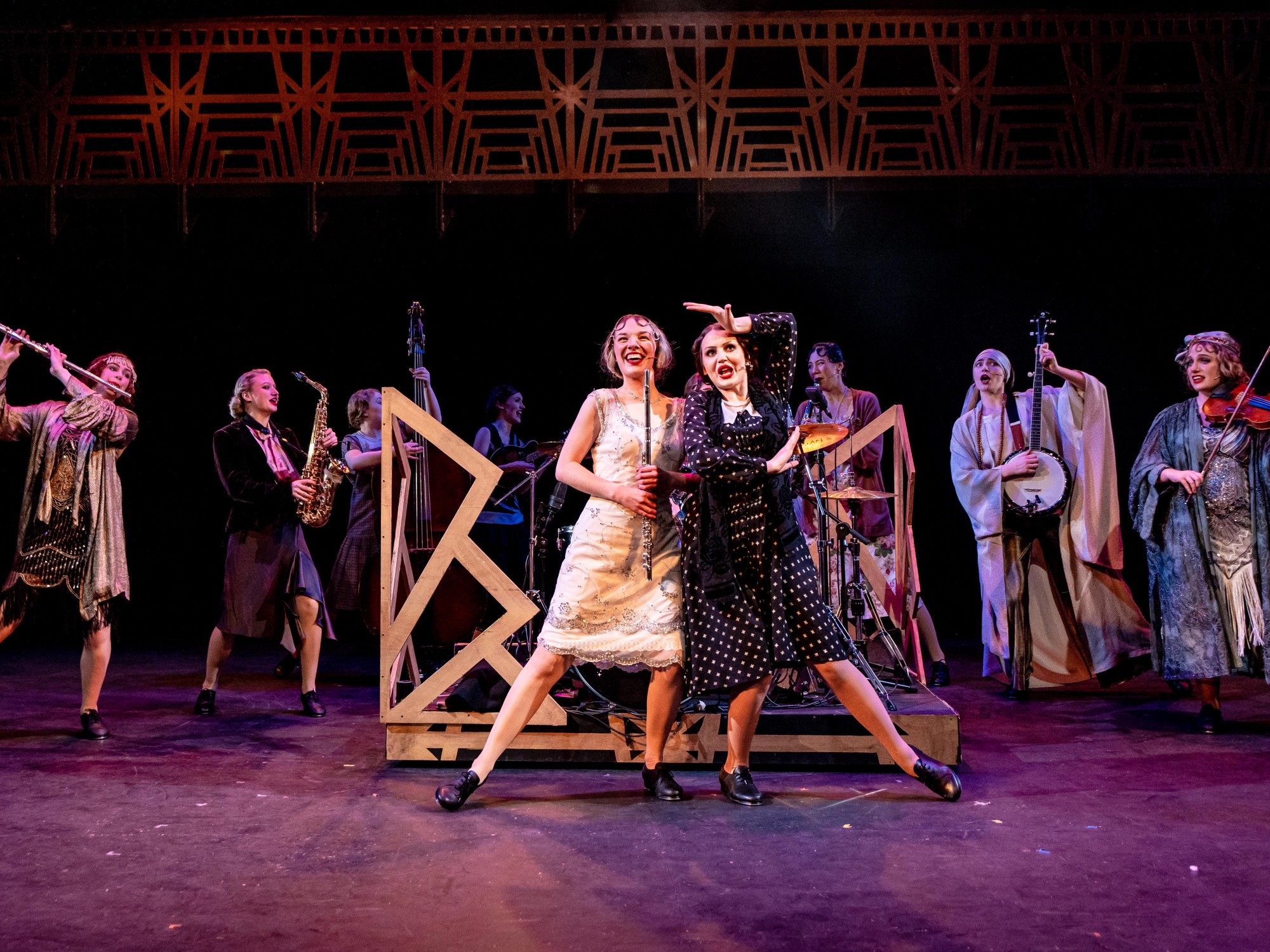
- Teaching and Practice of Voice and Singing
MA — 2025 entry Teaching and Practice of Voice and Singing
This masters programme is unique in the sector and by studying it, you will be part of the next generation of voice and singing practitioners.
Why choose
this course?
- Guildford School of Acting (GSA) is one of the UK’s leading accredited drama schools, providing dedicated conservatoire training within a purpose-built environment on the University of Surrey campus.
- This practice-based interdisciplinary MA Teaching and Practice of Voice and Singing programme is designed to build upon students’ existing experience and expertise, in either or both disciplines.
- It will provide a unique opportunity for the research and development of specialist vocal techniques appropriate to the demands of professional interdisciplinary performing arts, which may include both spoken text and singing. It also has the integrated feature of offering both voice and singing training.
- We keep our cohorts small to ensure you get personal attention and contact from our expert teachers, who have extensive first-hand experience in professional theatre in the UK and from around the world.
- Upon completion of your degree, you will have experiential knowledge and critical understanding of vocal practice, as well as an integrated approach to the teaching and coaching of voice and singing. You will be well-equipped to progress in the professional world of voice and singing teaching, building sustainable and rewarding careers.
- GSA facilities rank amongst some of the best professional training facilities in the UK conservatoire sector. As part of the University of Surrey, our students also have full access to the university's facilities, offering you world-class conservatoire training in a top university environment. Truly the best of both worlds!
Statistics
Fantastic graduate prospects
94% of our GSA postgraduate students go on to employment or further study (Graduate Outcomes 2024, HESA)
Top 10 in UK
Surrey is ranked 9th in the UK for overall satisfaction (Postgraduate Taught Experience Survey 2023)
Top 20 in UK
Surrey is ranked in the top 20 for the quality of our research outputs (Research Excellence Framework 2021)
What you will study
You will study three compulsory modules:
- Voice fundamentals (phonetics, accents and anatomy)
- Voice and singing pedagogies
- Integrated teaching practice (intensive public-facing placements).
Our campus boasts great transport links to London, so you’ll be close to the heart of UK theatre in London’s West End.
GSA delivers its provision across three teaching blocks, within the University of Surrey’s existing semester structure.
The structure of our programmes follows clear educational aims that are tailored to each programme. These are all outlined in the programme specifications which include further details such as the learning outcomes:
Modules
Modules listed are indicative, reflecting the information available at the time of publication. Modules are subject to teaching availability, student demand and/or class size caps.
The University operates a credit framework for all taught programmes based on a 15-credit tariff, meaning all modules are comprised of multiples of 15 credits, up to a maximum of 120 credits.
Course options
Year 1
Semester 1 & 2
Compulsory
This module is intended to provide students with a sound working knowledge of the bio-mechanical systems relating to the sung and spoken voice. Students will be required to demonstrate this in their own vocal practice and to effectively impart this knowledge and understanding to others. The study of Phonetics will equip students with a variety of strategies to transcribe and coach accents whilst refining their kinesthetic and auditory awareness. This will support their "Voice and Singing Pedagogies" module, connecting the fundamentals of Anatomy and Accents to the delivery of Voice and Singing teaching and coaching.
View full module detailsThis module is intended to introduce students to a wide variety of leading spoken and singing voice practitioners, providing a broad historical overview of pedagogic principles. Students will engage with a range of approaches and methodologies both in practice and research; deepening their understanding of Voice and Singing pedagogies and, ultimately, developing their own tools and practice in the disciplines of Voice and Singing. This module will build upon the fundamentals of Anatomy and Phonetics, and afford students the opportunity to begin to build specialist pedagogical interests.
View full module detailsThis module builds upon work undertaken in all previous modules and aims to enable students to achieve professional level entry into the industry for which they have trained. The core of this module is two-fold, consisting of external placement hours and the main research project (Sustained Independent Project, or SIP) at the end of the programme. These two aspects will give students the opportunity to draw together and apply information and experiences gathered over the course to their work on placement and to the selection and execution of research ideas for their SIP. Students can expect to develop further independence and autonomy in their practice through their work on this module. In their work on placement and on their SIP, students will be expected to develop and utilise both academic and professional skills, such as critical reflection and effective communication, both verbal and written.
View full module detailsThis module builds upon the knowledge and skills developed across Vocal Fundamentals and Voice and Singing Pedagogies to enable students to advance and sophisticate their individual teaching and/or coaching practice. Through assisting an internal project and then critically evaluating their process, students can expect to develop a growing independence and autonomy in their teaching, further develop their ability to link theoretical concepts into practical action, and to develop effective communication skills, both verbal and written.
View full module detailsGeneral course information
Contact hours
Contact hours can vary across our modules. Full details of the contact hours for each module are available from the University of Surrey's module catalogue. See the modules section for more information.
Timetable
Course timetables are normally available one month before the start of the semester.
New students will receive their personalised timetable in Welcome Week, and in subsequent semesters, two weeks prior to the start of semester.
Please note that while we make every effort to ensure that timetables are as student-friendly as possible, scheduled teaching can take place on any day of the week (Monday – Friday). Wednesday afternoons are normally reserved for sports and cultural activities. Part-time classes are normally scheduled on one or two days per week, details of which can be obtained from Academic Administration.
Location
This course is based at Stag Hill campus. Stag Hill is the University's main campus and where the majority of our courses are taught.
We offer careers information, advice and guidance to all students whilst studying with us, which is extended to our alumni for three years after leaving the University.
GSA has an excellent reputation as a conservatoire, and graduates are sought for a variety of roles in the performing arts, as teachers, performers, creatives and production staff. We consistently nurture students to become highly employable leaders in their field and resilient graduates, with a sophisticated toolkit of transferable skills.
GSA is part of the Federation of Drama Schools (FDS), the Alliance of Musical Theatre Conservatoires (AMTC) and the Global Conservatoire Alliance (GCA).
The MA programme focuses on the development of specialist skills and knowledge, producing highly skilled teachers and coaches, ready to enter their respective specialist workforces. Students study core aspects of each field, gaining theoretical and practical skills as well as work placement at GSA, networking and career planning opportunities. All GSA students are equipped with both a practical and theoretical understanding of potential employment opportunities, and how to navigate them upon graduation.
Former graduates of GSA’s masters programmes have moved into careers related specifically to the training of voice and singing including, but not limited to, the following:
- Lecturer in Voice, Lecturers in Singing, Head of Singing at GSA
- International Outreach Project organiser for Cross-cultural Shakespearean Projects
- Head of Voice, Laines Theatre Arts
- Singing Teacher, Gothenburg Academy of Music and Drama, specialising in Musical Theatre, Sweden
- Professor of Voice, Seoul, South Korea
- Joint Head of Voice, Mountview Theatre School
- Vocal Tutor, University of Chichester
- Vocal Tutor, Dept Music and Media, University of Surrey
- PhD Research and Head of Singing, Victorian College of the Arts, Australia
- Head of Musical Theatre, Sharjah Performing Arts Academy, UAE
- Director, S&L Performing Arts, Hong Kong
- Teaching Fellow in Vocals at the Institute of Contemporary Music Performance (ICMP), London.
An MA qualification offers opportunities to teach at university-level (internationally) and will help students develop business and digital skills, creativity and imagination, dexterity, and good interpersonal skills.
Students at GSA have access to purpose-built studios and tutorial rooms within the GSA building, and across the University campus. The fully equipped studio spaces are fitted with mirrors and sound system.
Students will have the opportunity to train and practise in the:
- 190-seat Bellairs Theatre
- 80-seat Rex Doyle Studio
- 128-seat Performing Arts Technology Studios (PATS) theatre
- Founders Studio with a 128-capacity studio space
- 15 dance and rehearsal studios (facilities include sound system, ballet barres, sprung floors, keyboard/piano)
- 10 tutorial/practice rooms
- Foyer area with café.
UK qualifications
Applicants should hold a minimum of a 2:2 UK honours degree (or recognised international equivalent) in performance or coaching and/or have a minimum of five years performing and coaching experience in professional performance industries or performing arts training institutions.
Applicants will also need to demonstrate that they have the maturity and critical insight to engage with and develop the theoretical understanding that will inform, develop and enhance current practice in the field.
English language requirements
IELTS Academic: 6.5 overall with 6.0 in each component.
These are the English language qualifications and levels that we can accept.
If you do not currently meet the level required for your programme, we offer intensive pre-sessional English language courses, designed to take you to the level of English ability and skill required for your studies here.
Selection process
Applicants will be invited to submit an audition tape and selected candidates will be invited to interview.
Recognition of prior learning
We recognise that many students enter their course with valuable knowledge and skills developed through a range of ways.
If this applies to you, the recognition of prior learning process may mean you can join a course without the formal entry requirements, or at a point appropriate to your previous learning and experience.
There are restrictions for some courses and fees may be payable for certain claims. Please contact the Admissions team with any queries.
Scholarships and bursaries
Discover what scholarships and bursaries are available to support your studies.
Fees per year
Explore UKCISA’s website for more information if you are unsure whether you are a UK or overseas student. View the list of fees for all postgraduate courses.
October 2025 - Full-time - 1 year
- UK
- £12,900
- Overseas
- £22,400
- These fees apply to students commencing study in the academic year 2025-26 only. Fees for new starters are reviewed annually.
Payment schedule
- Students with Tuition Fee Loan: the Student Loans Company pay fees in line with their schedule (students on an unstructured self-paced part-time course are not eligible for a Tuition Fee Loan).
- Students without a Tuition Fee Loan: pay their fees either in full at the beginning of the programme or in two instalments as follows:
- 50% payable 10 days after the invoice date (expected to be October/November of each academic year)
- 50% in January of the same academic year.
- Students on part-time programmes where fees are paid on a modular basis: cannot pay fees by instalment.
- Sponsored students: must provide us with valid sponsorship information that covers the period of study.
The exact date(s) will be on invoices.
Apply online
To apply online first select the course you'd like to apply for then log in.
Select your course
Choose the course option you wish to apply for.
Sign in
Create an account and sign into our application portal.
Please note that we may have to close applications before the stated deadline if we receive a high volume of suitable applications. We advise you to submit your application as soon as it is ready.
ApplyAdmissions information
Once you apply, you can expect to hear back from us within 14 days. This might be with a decision on your application or with a request for further information.
Our code of practice for postgraduate admissions policy explains how the Admissions team considers applications and admits students. Read our postgraduate applicant guidance for more information on applying.
About the University of Surrey
Need more information?
Contact our Admissions team or talk to a current University of Surrey student online.
Terms and conditions
When you accept an offer to study at the University of Surrey, you are agreeing to follow our policies and procedures, student regulations, and terms and conditions.
We provide these terms and conditions in two stages:
- First when we make an offer.
- Second when students accept their offer and register to study with us (registration terms and conditions will vary depending on your course and academic year).
View our generic registration terms and conditions (PDF) for the 2024/25 academic year, as a guide on what to expect.
Disclaimer
This online prospectus has been published in advance of the academic year to which it applies.
Whilst we have done everything possible to ensure this information is accurate, some changes may happen between publishing and the start of the course.
It is important to check this website for any updates before you apply for a course with us. Read our full disclaimer.
